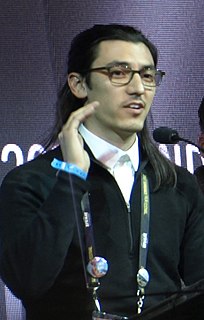A Quote by Greta Thunburg
I want the politicians to prioritise the climate question, focus on the climate and treat it like a crisis.
Related Quotes
Now, here's a good question: should serious people focus on global political instability - terrorism, failing states, nuclear weapons - or should we focus on global climate instability - droughts, floods, extreme weather? Here's the correct answer: yes, both, because climate disruption will make every other national security problem worse.
I have a sense of mission on this climate crisis, and I'm trying to pour all the energy I have into it. And I hope that I, along with others, can catalyze the emergence of real solutions to the climate crisis. I think we're making a lot of progress. I think we're going to win this, but it matters how quickly we win it. So I'm focused on that.
Despite the international scientific community's consensus on climate change, a small number of critics continue to deny that climate change exists or that humans are causing it. Widely known as climate change "skeptics" or "deniers," these individuals are generally not climate scientists and do not debate the science with the climate scientists.
To look at the climate crisis alone - and in my view this is an election where we're not just deciding what kind of a world we will be but whether we will have a world or not, going forward. And the climate crisis, for one thing, you know, Hillary [Clinton] has not repudiated fracking by any means, nor fossil fuels.
Scientists tend to focus on what they don't know more than what they do know. And there are a lot of things we still don't know about the climate. But we know the difference between climate variability and climate change, and right now the amount of carbon in the atmosphere is well outside the variability pattern - and that's quite quantifiable.
The question of place and climate is most closely related to the question of nutrition. Nobody is free to live everywhere; and whoever has to solve great problems that challenge all his strength actually has a very restricted choice in this matter. The influence of climate on our metabolism, its retardation, its acceleration, goes so far that a mistaken choice of place and climate can not only estrange a man from his task but can actually keep it from him: he never gets to see it.


































